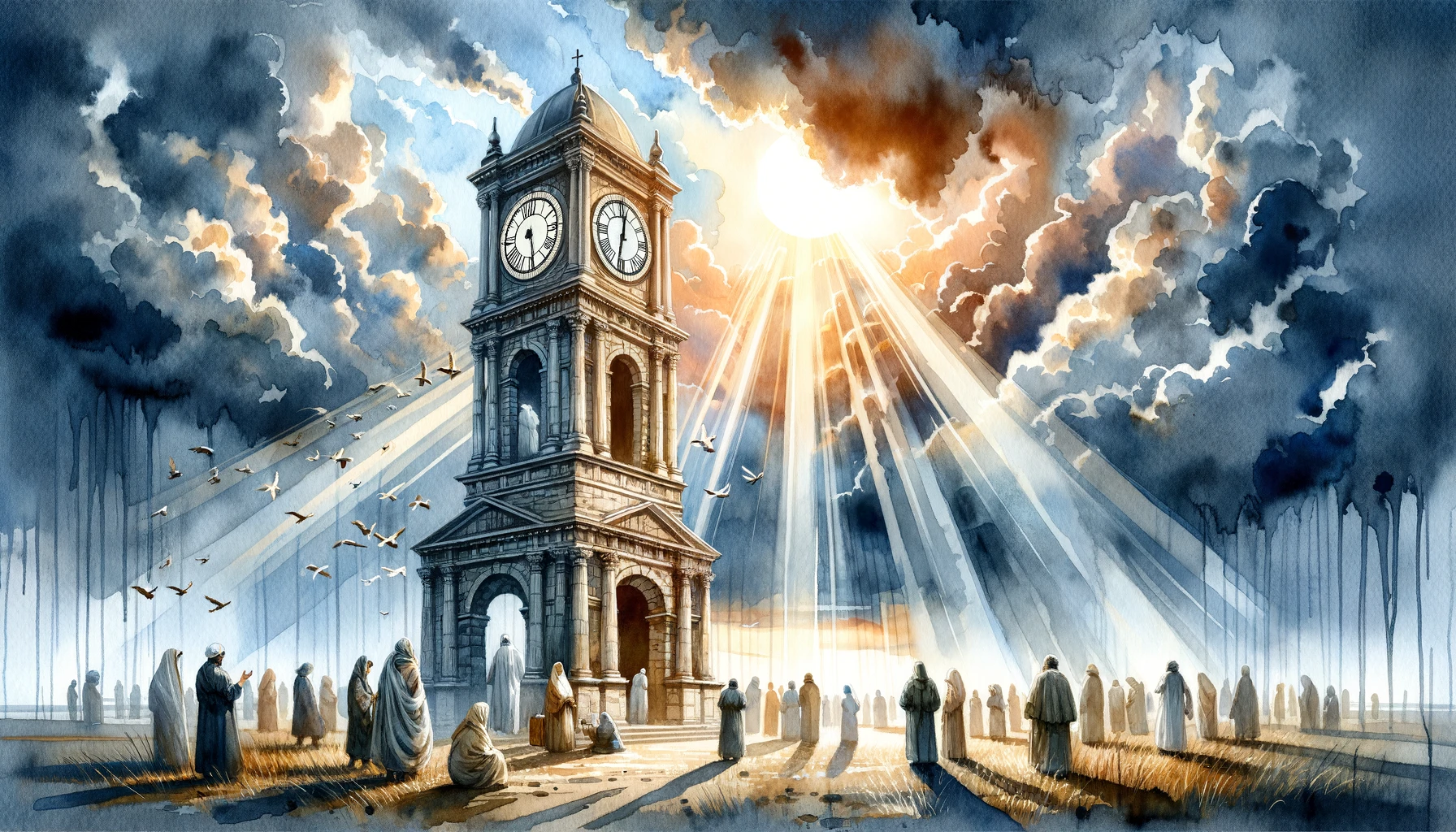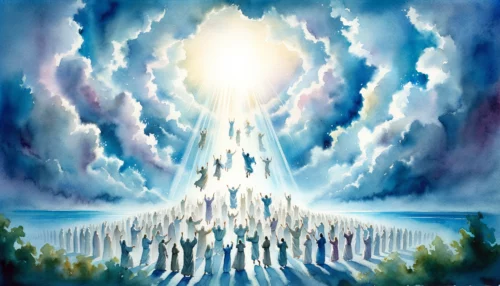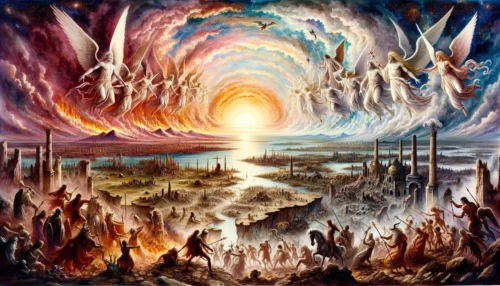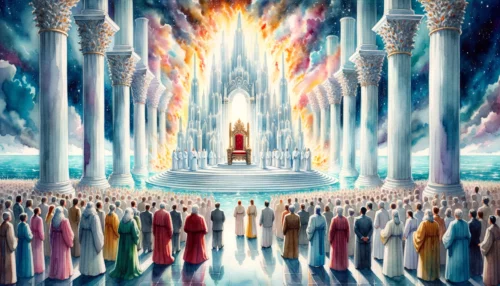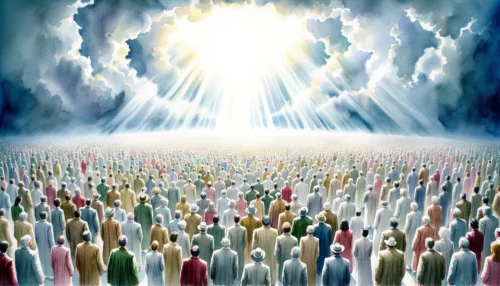The return of Jesus Christ has been a central theme in Christianity, sparking curiosity, concern, and anticipation among believers worldwide. His Second Coming is foretold in the Bible, with several scriptures offering clues about this crucial event. But when exactly will this happen? This question has caused much speculation and debate over centuries. Let’s explore this topic in light of biblical teachings.
The Timing of Christ’s Return: An Overview
The Bible provides a fascinating perspective on the timeline of Christ’s return. The scriptures do not pinpoint a specific date or time, maintaining an element of divine mystery that characterizes the very nature of God’s sovereignty. The Bible consistently reminds believers that the precise moment of Christ’s Second Coming is unknown, a secret kept by God the Father alone (Matthew 24:36).
To better understand this, we look into Jesus’ teachings to His disciples. He shared an illustration about a master who went on a journey, leaving his servants in charge of various duties. The message was clear: the servants must always be ready for the master’s return, which could happen at any moment. This story is a metaphor for Christ’s return – the timing is unknown, requiring continual readiness from His followers (Matthew 24:42-44).
In another teaching, Jesus likened His return to the unpredictability of the days of Noah. Just as people in Noah’s time were unaware of the impending flood until it arrived, Jesus’ Second Coming will also catch many off guard. This underscores the unexpectedness of His return, and once again, the importance of continual preparedness (Matthew 24:37-39).
The Apostle Paul echoes this theme in his letters. He encourages believers to live as though Jesus might return at any moment, advising them to conduct their lives in a manner worthy of God’s calling. He warns that Jesus’ return will be swift and sudden, like a thief in the night (1 Thessalonians 5:2).
In the Book of Revelation, the last book in the Bible, the theme of unpredictability is further emphasized. It opens with the phrase “the time is near” (Revelation 1:3), a phrase reiterated throughout the book, underscoring the immediacy and unexpectedness of the events it describes, including Jesus’ Second Coming.
A look at these biblical passages reveals an important principle: the unpredictability of the timing of Christ’s return is not a cause for fear or anxiety, but a call to faithfulness, vigilance, and readiness. The scriptures encourage us to always be prepared, to live righteously, and to be faithful in the tasks God has entrusted us.
The exact timing of Jesus’ return is a divine secret, only known to God the Father (Matthew 24:36). Jesus taught the importance of readiness and vigilance, as His return could happen at any unexpected moment (Matthew 24:42-44, Matthew 24:37-39). Apostle Paul and the Book of Revelation reaffirm this theme, emphasizing the unpredictability and suddenness of His return (1 Thessalonians 5:2, Revelation 1:3). Thus, the Bible invites us to live in a constant state of preparedness, righteousness, and faithfulness, fulfilling the tasks entrusted to us by God.
Scriptures Concerning Jesus’ Second Coming
There is a multitude of scriptures referring to the Second Coming of Jesus, each offering its unique insight and contributing to a more holistic understanding of this major event in Christian eschatology. The Book of Revelation provides some of the most detailed prophetic visions of what is to come. Written by John, it talks about a time when every eye will see Jesus, even those who caused His suffering (Revelation 1:7). This signals the global nature of His return, visible to all humanity, not confined to a specific region or group.
Another essential scripture is found in Paul’s letters to the Thessalonians. Here, he describes a time when Jesus will descend from heaven with a loud command, the voice of an archangel, and with the trumpet call of God. The dead in Christ will rise first, followed by those who are alive and have remained faithful. They will be caught up together in the clouds to meet the Lord in the air (1 Thessalonians 4:16-17). This vivid picture depicts not just Christ’s return but the resurrection of the faithful, signaling a new era of eternal life.
In the Gospels, Jesus Himself speaks of His return. He says that He will come back in the same way He ascended into heaven – visibly, in the clouds, and from the sky (Acts 1:9-11). This account is supported by the testimony of two angels who appeared to the disciples as they watched Jesus ascend into heaven after His resurrection.
Christ’s return is also associated with a time of judgment. In the Gospel of Matthew, Jesus shares a parable of the sheep and the goats (Matthew 25:31-46). The parable illustrates that when He returns as King, He will separate people as a shepherd separates the sheep from the goats. This separation is symbolic of the final judgment, wherein people’s lives will be evaluated based on their faith and actions.
The scriptures point to the triumphant return of Jesus as a victorious King, a judge, and a loving Savior who will resurrect His faithful followers to eternal life. They convey the message of hope, triumph over evil, restoration, and the establishment of God’s kingdom on earth.
Numerous scriptures describe Jesus’ Second Coming. The Book of Revelation signals the global visibility of His return (Revelation 1:7), while Paul’s letter to the Thessalonians details the resurrection of the faithful at Jesus’ return (1 Thessalonians 4:16-17). Jesus Himself confirms His visible return from the sky, as recorded in the book of Acts (Acts 1:9-11), and Matthew’s Gospel depicts His role as a judge during His return (Matthew 25:31-46). These scriptures portray Jesus’ return as triumphant, bringing hope, victory, restoration, and the establishment of God’s kingdom.
Living in Expectation of Christ’s Return
The Bible encourages believers to live their lives in anticipation of Jesus’ return. This anticipation is not a passive waiting but an active readiness marked by faithful living and godly conduct. As indicated by Jesus in the parable of the faithful and wise servant (Matthew 24:45-51), we are expected to be diligent in performing our given tasks and responsibilities, living each day as if it could be the day of His return.
Peter encourages believers to live holy and godly lives as they look forward to the day of God (2 Peter 3:11-12). This includes living righteously, pursuing peace, and growing in the grace and knowledge of our Lord and Savior Jesus Christ. It is a call to maintain spiritual growth, personal integrity, and moral purity.
Another aspect of living in expectation of Jesus’ return is witnessing for Christ. The Great Commission, as recorded in the Gospel of Matthew (Matthew 28:19-20), lays out the task of making disciples of all nations. This involves spreading the good news of Jesus Christ, teaching others about His teachings, and baptizing them in the name of the Father, the Son, and the Holy Spirit.
The anticipation of Christ’s return should also stir in us a longing for justice and the establishment of God’s kingdom on earth. According to the Lord’s Prayer, Jesus taught His followers to pray for God’s kingdom to come and His will to be done on earth as it is in heaven (Matthew 6:10). This involves seeking justice, showing mercy, and walking humbly with God.
Paul, in his letters to the Corinthians, reminds us of the importance of remaining steadfast, immovable, and always abounding in the work of the Lord, knowing that our labor in the Lord is not in vain (1 Corinthians 15:58). This assurance encourages us to remain committed and dedicated in our service to God and others.
The Bible encourages believers to live in active anticipation of Jesus’ return. This involves being diligent in our responsibilities (Matthew 24:45-51), living holy and godly lives (2 Peter 3:11-12), and witnessing for Christ as part of the Great Commission (Matthew 28:19-20). It also includes longing for justice and the establishment of God’s kingdom (Matthew 6:10), and remaining steadfast, immovable, and committed in our service to God and others (1 Corinthians 15:58). This active anticipation is characterized by faithful living, righteousness, witnessing, justice, and dedicated service.
The Anticipation of His Glorious Return
The uncertainty surrounding the precise timing of Jesus’ return, as the Bible depicts, is a divine mystery. However, the certainty of His return remains a cornerstone of Christian belief. This divine promise inspires believers to live faithfully, maintain godly conduct, and continually bear witness to Christ’s teachings. The anticipation of His return fosters a profound hope for the ultimate establishment of God’s kingdom and the fulfilment of divine justice.
As we conclude, consider these thought-provoking questions:
- How does the certainty of Christ’s return impact your daily life and decisions?
- How are you actively participating in the Great Commission as you anticipate His return?
- How does your life reflect a longing for the establishment of God’s kingdom?
In the midst of life’s complexities and challenges, let the anticipation of Christ’s return illuminate your path. The dawn of His glorious return might be unknown, but the light it promises is certain and unchanging. Let this hope anchor your faith, invigorate your service, and inspire your pursuit of righteousness, as you await the dawn of His glorious return.




